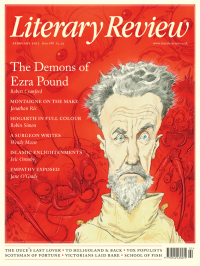Jonathan Mirsky
Communist Poster Boy
No Wall Too High
By Xu Hongci (Translated by Erling Hoh)
Rider Books 314pp £20
There are many memoirs by Chinese imprisoned during the Cultural Revolution (1966–76), but I’ve never read one, by a loyal Party member, like this. Xu Hongci’s ordeal began in 1957 and continued until his final escape, in 1972, from China’s gulag into Mongolia. Erling Hoh, whose translation makes this ghastly story riveting, rescued the manuscript from the belongings of Xu’s Mongolian widow. The story was already known in China but this translation makes it available to an international readership.
In 1957, Mao Zedong invited his subjects to speak honestly, even critically, about the Party and the regime, ‘tempting the snakes out of their holes’, as it was later alleged. Trustingly, many complied. Xu, a medical student and an ardent Party member, led the way in drafting and putting up a dazibao (‘big character poster’), which condemned Party elections as ‘fake’, criticised Mao for his secret inspection tours and his links to the Soviet Union, and urged that students be allowed to choose which foreign languages they learned. Other people soon put up their own posters. In the light of what we now know about the Chinese Communist Party, which has imprisoned Liu Xiaobo, a Nobel Peace Prize winner, for many years, those posters seem foolhardy, but at that time, if Mao invited frank criticism, who could refuse?
Although Xu was pleased with what he had done, he was also uneasy. ‘I sensed a conspiracy and that I, excluded from the inner circle, had foolishly and blindly fallen straight into their trap.’ He recalls that 6 June 1957 ‘was the longest day of my life. In truth, it

Sign Up to our newsletter
Receive free articles, highlights from the archive, news, details of prizes, and much more.@Lit_Review
Follow Literary Review on Twitter
Twitter Feed
Margaret Atwood has become a cultural weathervane, blamed for predicting dystopia and celebrated for resisting it. Yet her ‘memoir of sorts’ reveals a more complicated, playful figure.
@sophieolive introduces us to a young Peggy.
Sophie Oliver - Ms Fixit’s Characteristics
Sophie Oliver: Ms Fixit’s Characteristics - Book of Lives: A Memoir of Sorts by Margaret Atwood
literaryreview.co.uk
For a writer so ubiquitous, George Orwell remains curiously elusive. His voice is lost, his image scarce; all that survives is the prose, and the interpretations built upon it.
@Dorianlynskey wonders what is to be done.
Dorian Lynskey - Doublethink & Doubt
Dorian Lynskey: Doublethink & Doubt - Orwell: 2+2=5 by Raoul Peck (dir); George Orwell: Life and Legacy by Robert Colls
literaryreview.co.uk
The court of Henry VIII is easy to envision thanks to Hans Holbein the Younger’s portraits: the bearded king, Anne of Cleves in red and gold, Thomas Cromwell demure in black.
Peter Marshall paints a picture of the artist himself.
Peter Marshall - Varnish & Virtue
Peter Marshall: Varnish & Virtue - Holbein: Renaissance Master by Elizabeth Goldring
literaryreview.co.uk